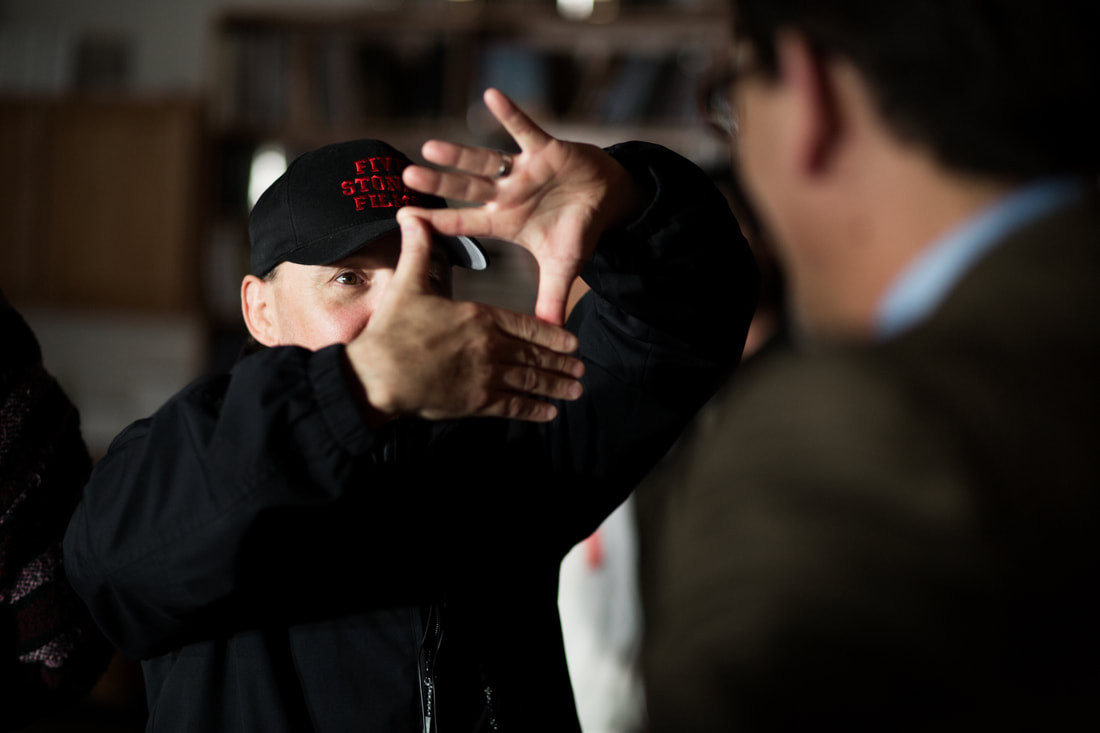|
On Friday night I went to see the latest Gavin O’Connor movie The Way Back with my boys Brett and Brolin. Who is Gavin O’Connor? Good question! He is the director of Miracle (2004), the inspiring true story of the USA men’s hockey team winning the 1980 Olympic gold medal. He also directed Warrior (2011), one of my five favorite movies of all time. Warrior follows the journey of two estranged brothers, both UFC fighters, struggling with their relationship and their alcoholic father. He also directed Ben Affleck in arguably his best role, The Accountant (2016).
I was doubly excited to see The Way Back because it reunites O’Connor with Affleck (Jack Cunningham) in a role tailor made for him: a struggling alcoholic hired to coach his old high school basketball team. Over the past year, Ben Affleck has been vocal about his personal struggles with alcoholism. The movie trailer looked awesome --lots of basketball, pain and triumph. The movie began in a very O’Connor-like fashion: terrific establishing shots of the landscape, personal shots of the protagonist’s day-to-day routine, and a simple musical score to magnify the loneliness and desperation of the main character. The first third of the movie felt a little like Groundhog Day as Jack Cunningham drowns his sorrows in lots and lots of beer. I was a little surprised at the early monotony of the film, as most O’Connor films have a dramatic inciting incident early on that gives direction to the developing storyline. Once Cunningham is hired to coach the dreadful Bishop Hayes Catholic high school basketball team, the energy of the film picks up. I anticipated a strong secondary storyline to emerge with their point guard Brandon. But it never materialized. Instead a montage of quick images shows the team on a winning streak. Later in the film, another secondary narrative emerges as Cunningham meets up with his ex-wife. Spoiler alert. The team miraculously makes the playoffs but Cunningham is mercilessly fired before they begin because of his drinking problem. The movie ends with the team in their first playoff game, while Cunningham is far way, playing pickup basketball. I walked out of the theater disappointed. Why? The movie trailer was more uplifting than the movie (not a good sign), and the secondary storylines didn’t capture my imagination. All in all, I’d give the movie a 6.5/10. Ouch! Sorry Gavin. Great films have this in common: strong stories with secondary storylines that engage us emotionally and help us buy into the overall narrative. Think of Forest Gump, with Jenny’s reckless, drug-filled journey, or Lord of the Rings, with its many rich secondary stories supporting Frodo and Sam’s journey to Mount Doom. As I watched The Way Back with disappointment, I was reminded that people want to become emotionally invested in the characters’ journeys, and that this investment only happens when strong secondary stories bring them deeper into the primary story. The Way Back prompted me to reflect on my most recent film, Because of Grácia, and as I looked back, I was encouraged by the ways that audiences had connected with its multiple storylines: the growing friendship of Grácia and Chase; the complicated relationships between Bobbi, her boyfriend Jesse and her father; the other rich friendships including Grácia’s growing connection with Bobbi; and Chase’s personal journey as he struggles with being a closet Christian. Films, like life, need to be multidimensional. I invite you to check out Because of Grácia and let me know if you agree. director Tom
0 Comments
 The 92nd Academy Awards will be presented tonight at the Dolby Theater in Hollywood. For a number of years I held an Oscar Party where my guests and I guessed who would win the coveted awards. The person who guessed the most winners had their name engraved on a beautiful plaque. I couldn’t wait for the Academy Awards and our Oscar night festivities. That all changed about five years ago and sadly I haven’t seen them since. This seems odd for a film fanatic like myself but I’m not alone. The Academy Award ratings have plummeted over that same period as more and more people are tuning out Hollywood’s biggest night. The 2018 Oscars had the worst television ratings ever and last year was the second worst. I can’t tell you why others have stopped watching the Oscars but I’ll let you know why I no longer watch a program that went on my calendar months in advance, year after year. There are two specific reasons the show has lost its luster for me personally; the first is the acceptance speeches from tone-deaf celebrities. Whether it’s preaching about climate change while flying around the globe in private jets or telling me what to think about politicians or hot button topics like abortion. I’m not interested in knowing what artists think about politics or global issues while accepting an award. Ricky Gervais said it best at the Golden Globes, thank your agent and your God and get off the stage. The second reason I’ve lost interest, is that many of the films nominated for Best Picture and actors/actresses nominated for Best Actor/Actress over the last decade are not my cup of tea. The Academy members simply like films and performances that I’m not into to. I thought the best acting performance this year was from Paul Walter Hauser playing Richard Jewell but he wasn’t nominated for Best Actor. I honestly would have watched the Oscars just to see if he won but it wasn’t meant to be. Who knows, maybe the Academy Awards will change their ways and draw me back to this once coveted show. I’ll never say never, but this year I’ll be checking the winners on Monday, like I have the last four years. director Tom
Over the last month I was fortunate to see two British films at one of our local movie theaters; Yesterday, a Danny Boyle film and Blinded By the Light, directed by Gurinder Chadha. Boyle has directed some terrific films including Slumdog Millionaire (2008), Trainspotting (1996) and 127 Hours (2010). Chadha directed Bend it Like Beckham (2002), a delightful film about women’s soccer in the UK starring an unknown actress Kieira Knightly who went on to star in Pirates of the Caribbean (2003). Boyle is known for his unique visual style including the use of dutch tilt shots and Chadha likes to explore the lives of Indians living in England.
I was pleasantly surprised by Yesterday and Blinded by the Light for different reasons. Yesterday begins with a struggling musician (Jack Malik) and his long-suffering manger (Ellie Appleton) that believes in him in spite of multiple set backs and his inability to make it big. One night he tells Ellie he’s had it and is quitting the music scene and gets on his bicycle to ride home when the power goes out across the globe for thirteen seconds. When the power is restored Malik is hit by a bus (and survives). The power outage has caused an inexplicable change in history including the Beatles never existing. When Jack gets out of the hospital he discovers that he’s the only one who knows about the Beatles and he decides to cut an album using classic Beatles songs. Jack is discovered by Ed Sheeran, a famous musical artist from Britain and he becomes increasingly unhappy knowing he’s a fake who has stolen the songs of the most famous musical group to have ever existed. The story is predictable except for a scene between Jack and Ellie in a hotel room. After a night of heavy drinking they make out. This leads to the moment where they are going to sleep together. In that moment of passion Ellie says no to Jack because she doesn’t want to be a one-night stand for him. This moment of virtue eventually leads to the third act where they get married and have two kids, living happily ever after. Sounds a lot like courtship to me! In Blinded by the Light the main character Javed is an awkward Pakistani sixteen-year-old living in Britain in the late 1980’s. His family life is tense as he navigates the traditions of Pakistani life and living with teen angst while trying to figure out his place in the world through his poetry. A delightful Pakistani friend introduces him to Bruce Springsteen’s music and this begins a journey of self-discovery as he finds his voice and his place in the world. Again, I found the movie fairly predictable as he rebels against his parents, especially his domineering father who thinks his artistic endeavors are trite and impractical. He has rebellious classmates and supportive teachers who remind him to follow his dreams no matter what others think. This sets up a surprisingly emotional ending that reinforces the importance of our roots and never forgetting where we’ve come from and to honor our parents. The proverbial wisdom in this moment caught me off guard as I was waiting for Javed to tell his father off and walk into the sunset reminding the audience that life is all about me. The ending could have come off as sentimental and preachy but Javed was such an endearing character that it came across as sincere and inspiring. Blinded by the Light has an 88% positive rating from Rotten Tomatoes with no sex, no foul language and very little violence. Reviewers loved the story, the performances and were moved by the ending. This is a powerful reminder to me to stay true to my stories and to tell them honestly and not apologize for the Biblical life lessons. If you’re an up and coming storyteller I’d encourage you to see these films as well as Because of Grácia. All three films will hopefully inspire you to tell truthful stories, with memorable characters and storylines that make you want to do the right thing. director tom  Over the Christmas break, I surprised my youngest son Brolin by taking him to see the classic movie “It’s A Wonderful Life” on the big screen. The movie is about a man named George Bailey who plans to take his life so he can leave his family a life-insurance payout. The movie resonates because of its strong themes of family and faith, and the impact that just one man can have on his whole community. As we left the theater, I was taken with how well the film played on the big screen. My son loved it and wanted to talk as we drove home. Watching on the big screen, I saw something I’d never seen before. At one point, George is granted a glimpse of what his home town would be like if he had never been born. The town was no longer called Bedford Falls but Potterville, named after the ruthless businessman who gained control of most of the town. In the past, I had thought the film’s main message was George Bailey’s passion to fight the evils of capitalism, as he worked to provide the ordinary working person the dignity of owning their own home. While driving home, another theme occurred to me. Without George’s selfless passion and hard work, the entire community would have been consumed by a Darwinian attitude of survival of the fittest, creating a place where people no longer took care of each other or even knew each other, a place of faceless strangers, desperate and violent. This film reminded me why so many of our cities have become impoverished, not only financially, but also morally and spiritually. When we stop caring for one another, when we no longer see each other as valuable, the value we place on our own lives also diminishes. The tragic outcome for North America is that, sadly, suicide has become the second leading cause of death among teens. As we pulled into our garage, Brolin took the message a step further. He noted how George Bailey and his wife Mary had practiced courtship and chastity and cherished their four kids. Although a life crisis had brought George Bailey to a desperate place, a place where he considered suicide, and although family pressures could have caused Mary to consider the need for an abortion, abortion and suicide never became real options. Their reverence for life and the strong support of their community carried them through, even when things got tough. I’m so glad we saw “It’s A Wonderful Life” on the big screen. It’s no wonder that this life parable continues to touch lives 70 years after its first release. As Writer and Director of “Because of Grácia”, I can only imagine the joy of seeing families embrace its themes 70 years from now, being inspired to live out their faith in a world that desperately needs people like George and Mary Bailey, like Grácia and Chase. director tom |
(c) 2022 SERV OTHERS, LLC. All Rights Reserved.


 RSS Feed
RSS Feed